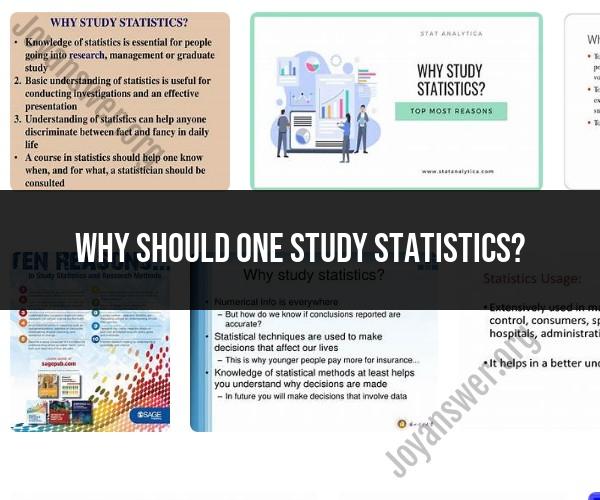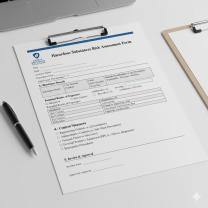Why should one study statistics?
Studying statistics is crucial for a variety of reasons, as it unlocks the power of data and provides valuable skills that have far-reaching applications in many fields. Here are some compelling reasons why one should study statistics:
Data-Driven Decision-Making: Statistics provide the tools and techniques needed to make informed decisions based on data rather than intuition or guesswork. In business, healthcare, science, and many other domains, data-driven decisions can lead to more efficient and effective outcomes.
Understanding Uncertainty: Statistics helps individuals and organizations deal with uncertainty. It provides methods for quantifying and managing risk, which is essential for making decisions in an uncertain world.
Scientific Research: Statistics is fundamental to the scientific method. Researchers use statistical techniques to analyze data, draw conclusions, and validate hypotheses. Without statistics, it would be challenging to conduct meaningful scientific studies.
Quality Control: In manufacturing and industry, statistical methods are used for quality control and process improvement. By analyzing data, organizations can identify defects, reduce waste, and optimize processes to produce higher-quality products.
Economic Analysis: Economists rely on statistics to analyze economic data, assess market trends, and make economic forecasts. Governments and businesses use economic statistics to inform policies and investments.
Public Policy and Social Sciences: Statistics plays a significant role in public policy analysis and social sciences. It helps policymakers and researchers gather and analyze data to address social issues, evaluate programs, and make evidence-based decisions.
Healthcare and Medicine: Statistical analysis is crucial in healthcare and medicine for clinical trials, epidemiology, and patient outcomes research. It aids in assessing the effectiveness of treatments, tracking disease trends, and improving patient care.
Marketing and Business Analytics: Businesses use statistics to understand consumer behavior, segment markets, and optimize advertising and marketing strategies. This helps companies target their products and services more effectively.
Environmental Science: Statistics is used in environmental science to analyze environmental data, assess the impact of human activities on the environment, and make recommendations for conservation and sustainable practices.
Education and Education Research: In the field of education, statistics is used to evaluate educational programs, measure student performance, and assess the effectiveness of teaching methods. It guides educational policies and reforms.
Personal Finance: Individuals can benefit from studying statistics to make better financial decisions. Understanding statistical concepts can help with budgeting, investment decisions, and retirement planning.
Data Science and Big Data: With the rise of big data, the demand for data scientists and analysts has surged. Statistics is a foundational skill in data science, allowing professionals to extract meaningful insights from large and complex datasets.
Critical Thinking: Studying statistics cultivates critical thinking skills. It teaches individuals to question assumptions, evaluate evidence, and draw conclusions based on data and evidence rather than emotions or biases.
In today's data-driven world, statistical literacy is an essential skill. It empowers individuals to navigate and interpret the vast amounts of data generated daily, make informed decisions, and contribute to advancements in various fields. Whether you're a student, professional, or simply interested in understanding the world around you, studying statistics is a valuable investment in your knowledge and problem-solving abilities.
The Value of Statistics: Why You Should Study this Vital Field
Statistics is the science of collecting, analyzing, and interpreting data. It is a vital field in the modern world, used in a wide range of disciplines, including business, economics, medicine, science, and government.
There are many reasons why you should study statistics. Here are a few:
- Statistics helps you make better decisions. By understanding statistics, you can better evaluate information and make more informed decisions in your personal and professional life.
- Statistics helps you understand the world around you. Statistics is used to study a wide range of phenomena, from the spread of disease to the impact of government policies. By understanding statistics, you can better understand the world around you and how it works.
- Statistics is in high demand. Statisticians are in high demand in a variety of industries. With a degree in statistics, you will have many job opportunities to choose from.
Empowering Knowledge: The Benefits of Studying Statistics
Studying statistics empowers you with the knowledge and skills to make better decisions, understand the world around you, and communicate complex information effectively.
Here are some specific benefits of studying statistics:
- Improved critical thinking skills. Statistics teaches you how to think critically about data and to identify patterns and trends. This skill is valuable in all areas of life, from making personal decisions to evaluating scientific studies.
- Enhanced problem-solving skills. Statistics provides you with the tools to solve complex problems. This skill is essential in many careers, such as business, finance, and engineering.
- Stronger communication skills. Statistics teaches you how to communicate complex information in a clear and concise way. This skill is valuable in all areas of life, from writing reports to giving presentations.
Statistical Literacy: Why Statistics Matters in the Modern World
Statistical literacy is the ability to understand and interpret statistics. It is an important skill in the modern world, where we are constantly bombarded with data.
Here are some reasons why statistical literacy matters:
- To make informed decisions. In order to make informed decisions in our personal and professional lives, we need to be able to understand and interpret statistics. For example, we need to be able to understand the risks and benefits of different medical treatments, the cost-effectiveness of different investment strategies, and the reliability of different polling data.
- To be a critical consumer of information. In the modern world, we are bombarded with information from a variety of sources. It is important to be able to critically evaluate this information and to identify potential biases. Statistical literacy can help us to do this by teaching us how to identify and interpret different types of statistical data.
- To be an active citizen. In order to be an active citizen in a democracy, we need to be able to understand and interpret government statistics. For example, we need to be able to understand the budget, crime statistics, and education statistics. This information can help us to make informed decisions about who to vote for and what policies to support.
Statistical literacy is an important skill for everyone in the modern world. By studying statistics, you can gain the knowledge and skills you need to make better decisions, understand the world around you, and be a critical consumer of information.













